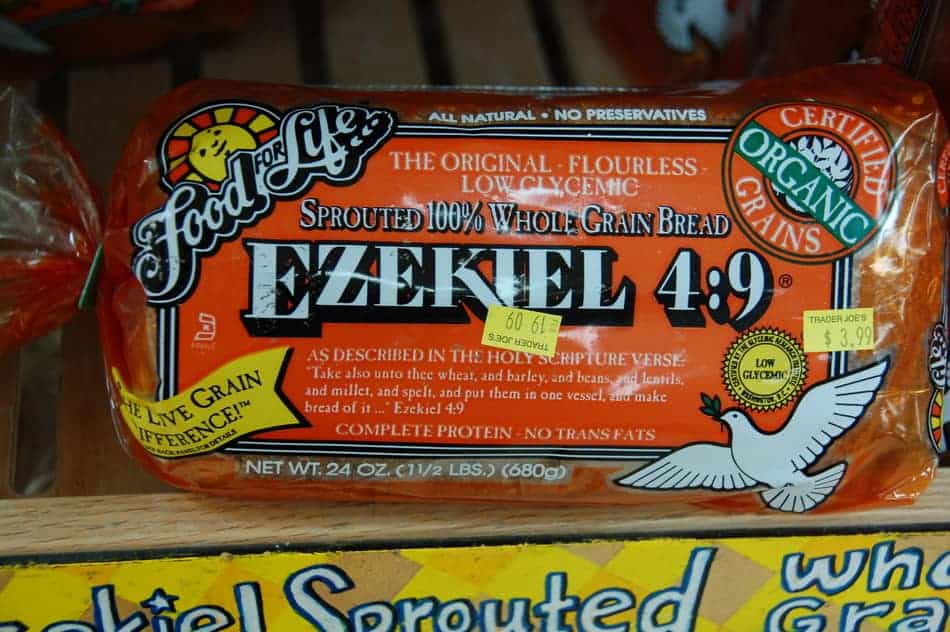Food for Life’s Ezekiel bread is a popular brand of sprouted bread, which is a type of bread made from germinated whole grains (i.e. grains that have been allowed to sprout prior to being milled into flour).1
In fact, Ezekiel bread boasts of being flourless, because, while the wheat kernels are ground, they’re not ground up sufficiently to produce flour.2
It seems to be marketed as a health food, and I usually encounter it in the refrigerated section of grocery stores, not far from vegan and vegetarian food products.
Is it vegan or vegetarian? Yes, Ezekiel bread is both vegan and vegetarian. There are a few varieties on the market, and they’re all some combination of sprouted grains and legumes, filtered water, yeast, gluten, and sea salt. All of which are 100% suitable for vegans and vegetarians.
What we’ll do here is go over the various reasons Ezekiel bread is considered both vegan and vegetarian-friendly.
Why Ezekiel Bread Is Vegan and Vegetarian
Keep in mind that, if a food product is vegan, then it’s by definition vegetarian (not the other way around). So, because Ezekiel bread is 100% plant-based, we’ll be using the term vegan from here on out.
The Main Ingredients Are 100% Plant-Based
Ezekiel bread is mostly composed of sprouted grains and legumes.
The main ingredients in Ezekiel bread include:3
- Wheat
- Barley
- Millet
- Lentils
- Soybeans
- Spelt
Any whole legume or whole grain can be sprouted, or germinated, into fresh greens. The process of germination enhances nutrient content, flavor, digestibility, and palatability.4
The sprouting process releases enzymes like alpha-amylase that break the starches down into smaller dextrins and sugars that are more readily digestible.5
Most know that grains and legumes are vegan, but I have been asked from time to time if sprouted grains and legumes require any sort of animal products in their production. Which is understandable, because some foods are animal-product free but actually require animal products in their processing (i.e. though they’re not present in the end product).
You can rest assured that sprouted grains and legumes do not require any animal products to be produced.
The sprouting procedure simply requires a jar equipped with a mesh top. These are either purchased at a health food store or made using a regular jar with cheesecloth, and rubber band (to secure the cloth).
After being rinsed, the seeds are placed in the jar along with three times as much water as the volume of seeds used.
Being soaked in lukewarm water overnight is usually enough for the majority of seeds to begin sprouting. This varies, of course. Smaller seeds often only need 4 hours while larger seeds, or seeds with very hard coats, often requiring 2 days.
After soaking sufficiently, the water is drained and the jar is stored in a warm, dark place, and covered with a towel. The jar is usually positioned at an angle so that it can continue to drain. The seeds continue to be rinsed in lukewarm water a couple of times a day, if not more.
Once the sprouts reach their maximum height, they’re placed in direct sunlight for a while to allow the development of chlorophyll.
Finally, they’re ready to be eaten or incorporated into bread after about 3 to 6 days.4
So, as you can see, no animal products are needed.
Obviously, this is how they would be made at home. Commercial food manufacturers would perform more or less the same process, but with specialized equipment.
Ezekiel Bread Doesn’t Contain Exogenous Enzymes
Not that it would render the bread non-vegan if they were to contain added enzymes. But, enzymes are listed in PETA’s list of animal-derived and potentially animal-derived ingredients.6
For this reason, exogenous enzymes (enzymes not already present in the grains or legumes) are often looked upon with suspicion.
While it’s true that certain enzymes can be sourced from animals, they still tend to be derived from plant sources. For example, alpha-amylases which are commonly added to bread products are recognized by the Vegetarian Resource Group (VRG) as being typically vegan.7
Anyway, with Ezekiel bread, we needn’t worry about enzymes, so this bread is suitable for the strictest of vegans.
The only enzymes in Ezekiel bread are those naturally present in the plant materials.
For example, malt, which is just is germinated or sprouted barley, is gently dried to leave intact the enzymes that are known to contribute to its characteristic flavor and color.8
The enzymes are important because they convert the starches to sugars like maltose (two glucose molecules bound together).
Ezekiel Bread Doesn’t Contain Animal-Derived Additives
Unfortunately, this is not a given for all types of bread. For example, rich breads like Hawaiian bread and Portuguese sweet bread contain a number of animal products, most being milk-derived.
Some breads make heavy use of eggs as a binder. Even though Ezekiel bread is considered flourless, it still contains its fair share of gluten, so it doesn’t require an outside protein source like egg to serve as a binder.
Sprouted grain breads tend to be marketed to health-conscious consumers, so they usually contain less extraneous ingredients. This is good news for vegans and vegetarians because anytime a food contains fewer additives, it lowers the odds that there are animal-derived ingredients in the mix. All else equal, of course.
Anyway, contrast that with something like Wonder Bread, which contains everything but the kitchen sink. It’s fortified with vitamin D, a fat-soluble vitamin made from a precursor derived from lanolin, aka sheep oil.
So, this type of bread typically contains fewer ingredients compared to other types of bread. Further, according to Wikipedia, Ezekiel breads specifically, tends to contain fewer ingredients than other popular brands of sprouted breads.1
Other Flavor Varieties
There are several varieties of the bread on offer by the brand.
The regular whole grain kind (Ezekiel 4:9 Sprouted Whole Grain Bread) contains:9
- Sprouted Wheat
- Filtered Water
- Organic Sprouted Barley
- Organic Sprouted Millet
- Organic Malted Barley
- Organic Sprouted Lentils
- Organic Sprouted Soybeans
- Organic Sprouted Spelt
- Fresh Yeast
- Organic Wheat Gluten
- Sea Salt
Other varieties use more or less the same ingredients, with a few additions—either dried fruit or other grains like brown rice or corn.
These include:
- 7 Sprouted Grains. This one contains the usual ingredients plus brown rice and corn. So, no problems here.10
- 7 Sprouted Grains, Cinnamon and Raisin Bread. This one, of course, just has extra grains along with cinnamon and raisins added to the mix.11
- Cinnamon and Raisin Bread. Additional cinnamon and raisins.12
- Flax Sprouted Whole Grain Bread. This one has been rolled in organic flax seeds.13
- Sesame Sprouted Whole Grain Bread. This one contains organic sesame seeds.14
- Genesis 1:29 Sprouted Whole Grain and Seed Bread. This one is similar to the original but is inspired by a different scripture verse. The main difference is that it contains a lot bigger variety of nuts and seeds, like amaranth and teff.15
That’s it for the vegan status of Ezekiel bread. Thanks for reading.
You may also want to check out the following related articles:
References
- Sprouted Bread. https://en.wikipedia.org/wiki/Sprouted_bread
- Sprouted Grains: Worth It? https://www.latimes.com/archives/la-xpm-2009-oct-12-he-nutrition12-story.html
- Sprouted Grain Bread: Ezekiel Bread. https://www.foodforlife.com/about_us/ezekiel-49
- Understanding Food: Principles and Preparation (Page 291). Amy Brown – Wadsworth Cengage Learning – 2011. ISBN-10: 0-538-73498-1
- Fahey JW. Underexploited African grain crops: A nutritional resource. Nutrition Reviews 56(9):282–285, 1998.
- Animal-derived Ingredients Resource: Living. https://www.peta.org/living/food/animal-ingredients-list/
- Questions About Food Ingredients. https://www.vrg.org/nutshell/faqingredients.htm#amylase
- Understanding Food: Principles and Preparation (Page 354). Amy Brown – Wadsworth Cengage Learning – 2011. ISBN-10: 0-538-73498-1
- Ezekiel Sprouted Bread: Food For Life: Ezekiel Bread Ingredients. https://www.foodforlife.com/product/breads/ezekiel-49-sprouted-whole-grain-bread
- 7 Sprouted Grains Bread https://www.foodforlife.com/product/breads/7-sprouted-grains-bread
- 7 Sprouted Grains Cinnamon Raisin Bread. https://www.foodforlife.com/product/breads/7-sprouted-grains-cinnamon-raisin-bread
- Ezekiel 4:9 Cinnamon Raisin Sprouted Whole Grain Bread. https://www.foodforlife.com/product/breads/ezekiel-49-cinnamon-raisin-sprouted-whole-grain-bread
- Ezekiel 4:9 Flax Sprouted Whole Grain Bread. https://www.foodforlife.com/product/breads/ezekiel-49-flax-sprouted-whole-grain-bread
- Ezekiel 4:9 Sesame Sprouted Whole Grain Bread. https://www.foodforlife.com/product/breads/ezekiel-49-sesame-sprouted-whole-grain-bread
- Genesis 1:29 Sprouted Whole Grain and Seed Bread https://www.foodforlife.com/product/breads/genesis-129-sprouted-whole-grain-and-seed-bread


